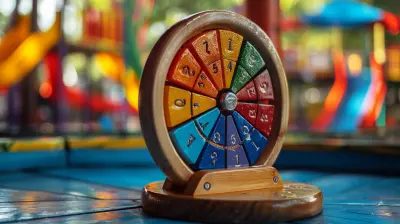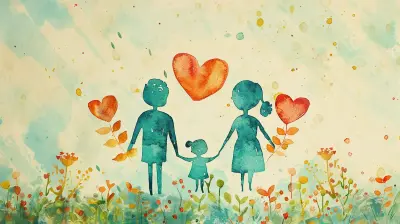The Importance of Emotional Independence for Your Teen's Overall Development
16 December 2024
Ah, teenagers. The hormonal hurricanes, the moody maestros, the eye-roll champions of the universe. It’s no secret that parenting teens can feel like playing a game of emotional dodgeball—except you’re blindfolded, and the dodgeballs are on fire. But let me tell you something that might just save your sanity (and theirs): emotional independence. Yep, that’s the magic potion your angsty adolescent needs to bloom into a functional adult instead of an overgrown toddler with a credit card.
So, grab a cup of coffee (or a glass of wine—no judgment here) and let’s dive into why emotional independence isn’t just important—it’s absolutely life-changing for your teen's overall development. You're welcome in advance. 
What the Heck Is Emotional Independence Anyway?
Let’s cut to the chase: emotional independence is when your teen stops treating you like their personal emotional support animal. Harsh? Maybe. True? Totally.It’s their ability to handle their feelings without needing you—or anyone else, for that matter—to swoop in like a superhero and “fix” everything. Think of it this way: you’re not raising a houseplant that needs constant watering (and pep talks). You’re raising a sturdy cactus that can thrive even if life gets a little dry.
When teens develop emotional independence, they:
- Learn how to manage stress (without screaming into their pillows for hours).
- Make decisions based on logic, not just emotions (Read: fewer "It seemed like a good idea at the time" moments).
- Become less dependent on external validation (No more heart-stopping moments when someone unfollows them on social media).
In short, emotional independence = fewer meltdowns and more resilience. And let’s be real—who wouldn’t want that? 
Why Your Teen Needs Emotional Independence Like You Need Coffee
1. It Builds Confidence (Because Awkwardness Is Not a Lifestyle Choice)
Let’s face it—teens are walking bundles of awkwardness. Puberty turns them into strange, gangly creatures who are half-kid, half-adult, and all kinds of unsure about themselves. Emotional independence gives them the confidence to navigate this hot mess of a phase without falling apart every time something goes wrong.Imagine this: Instead of crying in the bathroom because they bombed a math test, your teen shrugs it off, learns from their mistakes, and tries harder next time. (Cue your proud parent tears.) Confidence isn’t about being perfect; it’s about being okay with not being perfect. Emotional independence makes that possible.
2. It Helps Them Handle Rejection Without a Dramatic Monologue
Rejection is an unavoidable part of life. Whether it’s a college rejection letter, a breakup, or even their crush ignoring their DM, your teen is going to face it at some point. And spoiler alert: You won’t always be there to pick up the pieces.Teens who have emotional independence know how to process rejection without spiraling into a full-blown Shakespearean tragedy. Sure, they’ll still feel the sting (because they’re human), but they’ll also know that one rejection doesn’t define their worth. That’s some next-level adulting right there.
3. It Preps Them for the Real World (a.k.a. The Hunger Games)
Let’s be real—adulthood is basically survival of the fittest. And by “fittest,” I mean “those who can mentally cope with their boss sending passive-aggressive emails.” If your teen doesn’t learn emotional independence now, they’re going to struggle when life throws them curveballs later.Think of emotional independence as their mental survival toolkit. Without it, they're like someone trying to start a fire with wet matches. With it, they’re Bear Grylls—ready to conquer anything, even if that “anything” is bad Wi-Fi during a Netflix binge. 
Signs Your Teen Might Be Lacking Emotional Independence
Before you start patting yourself on the back (or panicking), let’s assess the situation. Here are some telltale signs your teen might need a little push toward emotional independence:- They rely on you for every decision. If they can’t even choose a cereal brand without your input, we’ve got a problem.
- They fall apart at the tiniest inconvenience. “The Wi-Fi is down! My life is OVER!” (Cue the dramatic flailing.)
- They need constant validation. If likes on Instagram determine their mood for the day, we need to talk.
If any of these sound familiar, don’t worry—you’re not alone. Now let’s fix it. 
How to Encourage Emotional Independence Without Losing Your Mind
1. Stop Playing Helicopter Parent
Look, I get it. Watching your kid struggle is about as fun as sitting through a two-hour PowerPoint presentation on tax law. But swooping in to save the day every time things get tough isn’t helping anyone. It’s like doing their homework for them—sure, it’s easier in the moment, but they’re never going to learn algebra (or life skills) if you keep bailing them out.Instead, let them face challenges head-on. Offer guidance, but don’t do the work for them. Think of yourself as their coach, not their personal assistant.
2. Teach Them to Name Their Feelings (Yes, Even the Weird Ones)
Teens are notorious for bottling up their emotions until they explode like a soda can that’s been shaken too hard. Help them break the habit by teaching them to identify and name their feelings.Feeling sad isn’t the same as feeling frustrated. And feeling annoyed isn’t the same as feeling overwhelmed. Once they can pinpoint what they’re feeling, they’ll have a better shot at figuring out how to deal with it.
Pro tip: Model this behavior yourself. If you’re having a bad day, say something like, “I’m feeling overwhelmed because work was stressful.” This shows them how it’s done without turning it into a therapy session.
3. Let Them Fail (and Resist the Urge to Say “I Told You So”)
Failure is life’s best teacher—period. If your teen never fails, they’ll never learn how to bounce back. So, when they forget their homework or bomb a presentation because they didn’t prepare, let them deal with the consequences.Sure, it’s tempting to swoop in with a “Mommy will fix it!” attitude, but that’s not doing them any favors. The real world doesn’t come with safety nets, and the sooner your teen learns that, the better.
4. Set Boundaries (Because You’re Not a 24/7 Therapist)
Listen, you love your teen. I know you do. But that doesn’t mean you have to be their emotional dumping ground every time they have a bad day. Setting boundaries is crucial—not just for their emotional growth but for your sanity.Encourage them to work through their feelings independently before coming to you. This might look like journaling, talking to a friend, or just spending some quiet time reflecting. You’re not shutting them out; you’re teaching them to stand on their own two feet.
What Happens When Teens Develop Emotional Independence?
Spoiler alert: It’s not just your teen who benefits. When they develop emotional independence, your life gets WAY easier too.- Fewer arguments. No more yelling matches over things that don’t actually matter. (Insert hallelujah chorus here.)
- More trust. You’ll feel confident letting them make their own decisions because you’ll know they can handle it.
- Better parent-teen relationship. When you’re not constantly playing referee for their emotions, you get to enjoy actually liking your teen again. Imagine that.
And let’s not forget the best part: your teen becomes a functional adult who can take care of themselves. Isn’t that the ultimate goal?
Final Thoughts
Let’s be honest—raising a teenager is basically like trying to nail Jell-O to a wall. It’s messy, frustrating, and sometimes feels impossible. But helping your teen develop emotional independence is one of the best gifts you can give them (right up there with teaching them how to do laundry without turning everything pink).It won’t happen overnight, and it definitely won’t be easy. But trust me, when your kid grows into a confident, resilient adult who can handle life’s curveballs with grace, you’ll realize it was all worth it.
Now, go high-five yourself for even reading this far. You’re doing amazing, parent.
all images in this post were generated using AI tools
Category:
Teenager IndependenceAuthor:

Steven McLain
Discussion
rate this article
12 comments
Phaedron Heath
Empowering teens emotionally fosters their growth beautifully!
March 7, 2025 at 4:28 PM

Steven McLain
Thank you! Empowering teens emotionally is indeed crucial for their growth and overall development.
Milena Gutierrez
“Teaching teens emotional independence is like giving them a map for their emotional GPS—without it, they might end up lost in their own feelings. Adventure awaits!”
February 5, 2025 at 3:50 AM

Steven McLain
Absolutely! Equipping teens with emotional independence is crucial for navigating their feelings and embracing life's adventures.
Ulrich Curry
Let’s be real: raising emotionally independent teens isn’t just a goal, it’s a survival strategy. Give them space to grow or prepare for the teenage drama show of a lifetime!
January 25, 2025 at 5:40 AM

Steven McLain
Absolutely! Allowing teens the space to grow fosters resilience and emotional independence, ultimately benefiting their overall development.
Runehart Lawrence
Emotional independence is crucial for teens; it empowers them to navigate life's challenges and build resilience for adulthood.
January 15, 2025 at 4:56 AM

Steven McLain
Thank you for your insightful comment! I completely agree—emotional independence is vital for teens as it equips them with the tools to face life’s challenges and fosters long-term resilience.
Rhiannon Fry
Emotional independence is crucial for teens; it fosters resilience, decision-making skills, and healthy relationships. Empower your child to navigate their emotions and cultivate self-reliance for a brighter future.
January 10, 2025 at 5:41 AM

Steven McLain
Thank you for your insightful comment! I completely agree—emotional independence plays a vital role in helping teens develop essential life skills and healthier relationships.
Runehart Erickson
Emotional independence is crucial for teens as it fosters resilience, self-awareness, and decision-making skills. By encouraging your teen to navigate their feelings and challenges independently, you're equipping them for adulthood. Embrace this journey—it's a vital step towards their overall development and future success.
January 3, 2025 at 5:27 PM

Steven McLain
Absolutely! Emotional independence is essential for teens, as it builds resilience and self-awareness, preparing them for a successful adulthood. Embracing this journey is key to their development.
Quinn McTavish
Emotional independence seems crucial for teens! I'm curious about practical strategies to foster this in everyday parenting. Excited to learn more!
December 29, 2024 at 5:41 PM

Steven McLain
Thank you for your enthusiasm! Practical strategies include encouraging open communication, promoting problem-solving skills, and fostering decision-making opportunities. Support their interests and validate their feelings to enhance their emotional independence.
Brick Vance
This article highlights a crucial aspect of parenting. Fostering emotional independence in teens not only boosts their self-esteem but also prepares them for future challenges. A must-read for all parents!
December 21, 2024 at 5:38 PM

Steven McLain
Thank you for your insightful comment! I'm glad you found the article valuable for fostering emotional independence in teens.
Niva McGinn
Thank you for this insightful article! I appreciate the emphasis on emotional independence for teens. It’s a vital yet often overlooked aspect of their growth. Your tips will definitely help me support my child in navigating this important stage of development.
December 17, 2024 at 5:12 PM

Steven McLain
Thank you for your kind words! I'm glad you found the article helpful. Supporting emotional independence in teens is indeed crucial for their growth.
Miles Harmon
Emotional independence fosters resilience in teens, empowering them to navigate challenges and build healthy relationships as adults.
December 17, 2024 at 6:05 AM

Steven McLain
Thank you for highlighting the crucial role of emotional independence! It truly is foundational for resilience and healthy relationships in adulthood.
Ford Cooper
Thank you for highlighting the significance of emotional independence. Encouraging our teens to navigate their feelings fosters resilience and prepares them for life's challenges. A valuable read!
December 16, 2024 at 5:14 PM

Steven McLain
Thank you for your thoughtful comment! I'm glad you found the article valuable—emotional independence is indeed key to building resilience in our teens.
Capri Young
Emotional independence is crucial for teens. It fosters resilience, self-awareness, and healthy relationships, empowering them to navigate challenges and develop into confident adults. Nurture their growth!
December 16, 2024 at 4:34 AM

Steven McLain
Thank you for highlighting the significance of emotional independence! Your insights on resilience and healthy relationships resonate deeply with the article's core message.
MORE POSTS

The Importance of One-on-One Time with Each Child

How to Advocate for Your Child’s Best Interests in Co-Parenting

Encouraging Hands-on Learning Opportunities Instead of Digital Games

Digital VS Analog Play: Striking the Best Balance

DIY Home Carnival: Create Fun Games with Items You Already Have

Teaching Your Teen to Navigate Social Independence and Responsibility

When You’re Stressed, They’re Stressed: Helping Kids Cope Through Your Calmness

Preparing Your Child for a New Sibling with Love and Patience